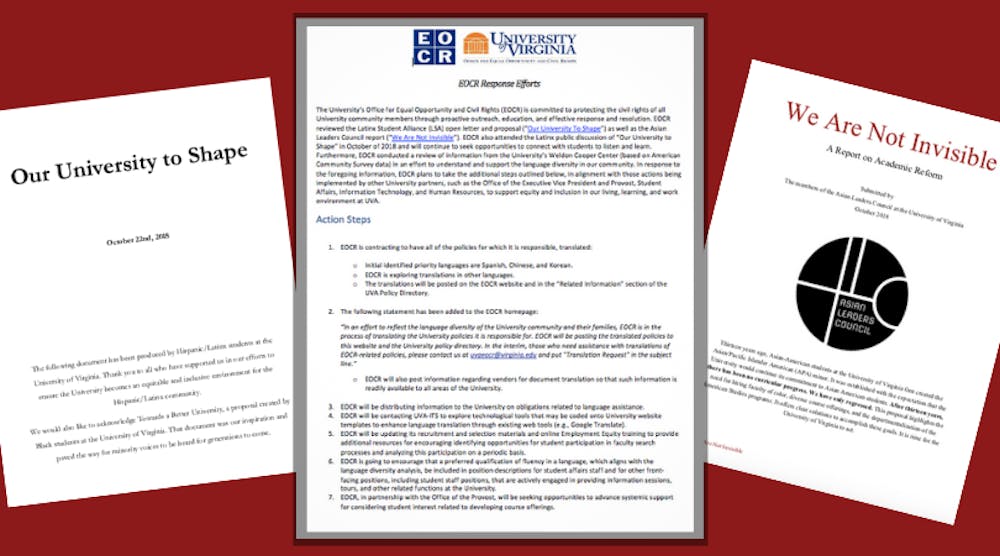The Office for Equal Opportunity and Civil Rights released a response last month outlining new goals meant to increase access and representation among minority groups at the University. The statement, dated Nov. 15, was released largely as a response to a report released by the Asian Leaders Council and a proposal put forth by the Latinx Student Alliance in October which called for increased support, resources and representation for Asian/Asian Pacific American students and Latinx students respectively.
The EOCR is a University office focused on promoting an equitable and diverse community on Grounds and is responsible for promoting equal access to community resources and activities.
The response outlines seven steps the EOCR plans to take in order to pursue some of the specific concerns that the ALC and LSA had outlined in their released reports, including translation of important parts of U.Va. life and academic changes. The report by Latinx/Hispanic students, entitled “Our University To Shape,” drew specific attention to a lack of financial aid documents translated into major languages other than English.
Catherine Spear, associate vice president in the EOCR, identified new language translation efforts in particular as playing a key role in the EOCR’s goals.
“EOCR sought to examine ways it could help advance equal access in relation to our language diversity at the University,” Spear said in an email statement to The Cavalier Daily. “Based on input from students, EOCR is focusing first on translations in a two-fold fashion: 1) seeking to identify and share a list of language assistance vendors with other stakeholders on Grounds, and 2) translating the policies for which EOCR is responsible into languages identified through the Demographics Research Group at the UVA Weldon Cooper Center.”
The EOCR response identified Spanish, Chinese and Korean as the initial priority languages for translation and the office is looking into other language options as well.
Other goals outlined by the EOCR response will be seeking to update recruiting practices by encouraging opportunities for student input in faculty searches and favoring fluency in secondary languages for student affairs positions.
One of the University students who led the effort in creating the LSA report, Angie Aramayo, a fourth-year College student and president of Latinx sorority Sigma Lambda Upsilon, said the EOCR response is an important step forward towards making the University more accessible and inclusive.
“We really appreciate the partnership of EOCR and their efforts to make the University more accessible to cultural and ethnic communities,” Aramayo said. “We appreciate that administrative units like EOCR have taken the initiative to improve the lives of students and hope that other administrative offices follow suit.”
Vilas Annavarapu, a third-year College student and Asian Leaders Council chair, also identified the intention to incorporate student interest in course offerings as a particularly valuable goal of the response.
“The University should be reflective of different academic interests that students would like to pursue, and student voice in an institutional fashion is necessary for allowing this to happen long term,” Annavarapu said. “When it comes to American Studies for example, specifically highlighting the importance of Asian-American studies and Latinx studies is really critical.”
Annavarapu cited issues surrounding the accessibility of the Asian Pacific American Studies minor program and lack of courses addressing the topic as an example of areas that might be improved upon.
“Incorporating student voice will not only highlight the immense value of certain courses that are offered, but will also point to the frustration that there aren't more of these courses offered,” Annavarapu said.
Both the LSA and ALC are actively working with University officials to departmentalize American Studies, according to Aramayo.
“Exploration of identity and all the intersections surrounding identity as explicated in the report are of the utmost value and the fact that EOCR is going to work with us to facilitate this in institutions is a really promising step,” Annavarapu said. “I hope that by incorporating student voice for a long time to come, our institution will become a leader in studying issues related to race and ethnicity and be really innovative in our research mission for what I hope becomes the American Studies department.”
Aramayo added that the LSA will continue to work with the University to ensure that these goals and further steps will be implemented.
“The concerns of our community have been heard,” Aramayo said. “It is now time for the University to take action and keep their promise to improving diversity and inclusion for its students.”
Correction: This article previously misspelled the name of Angie Aramayo and has since been updated.







